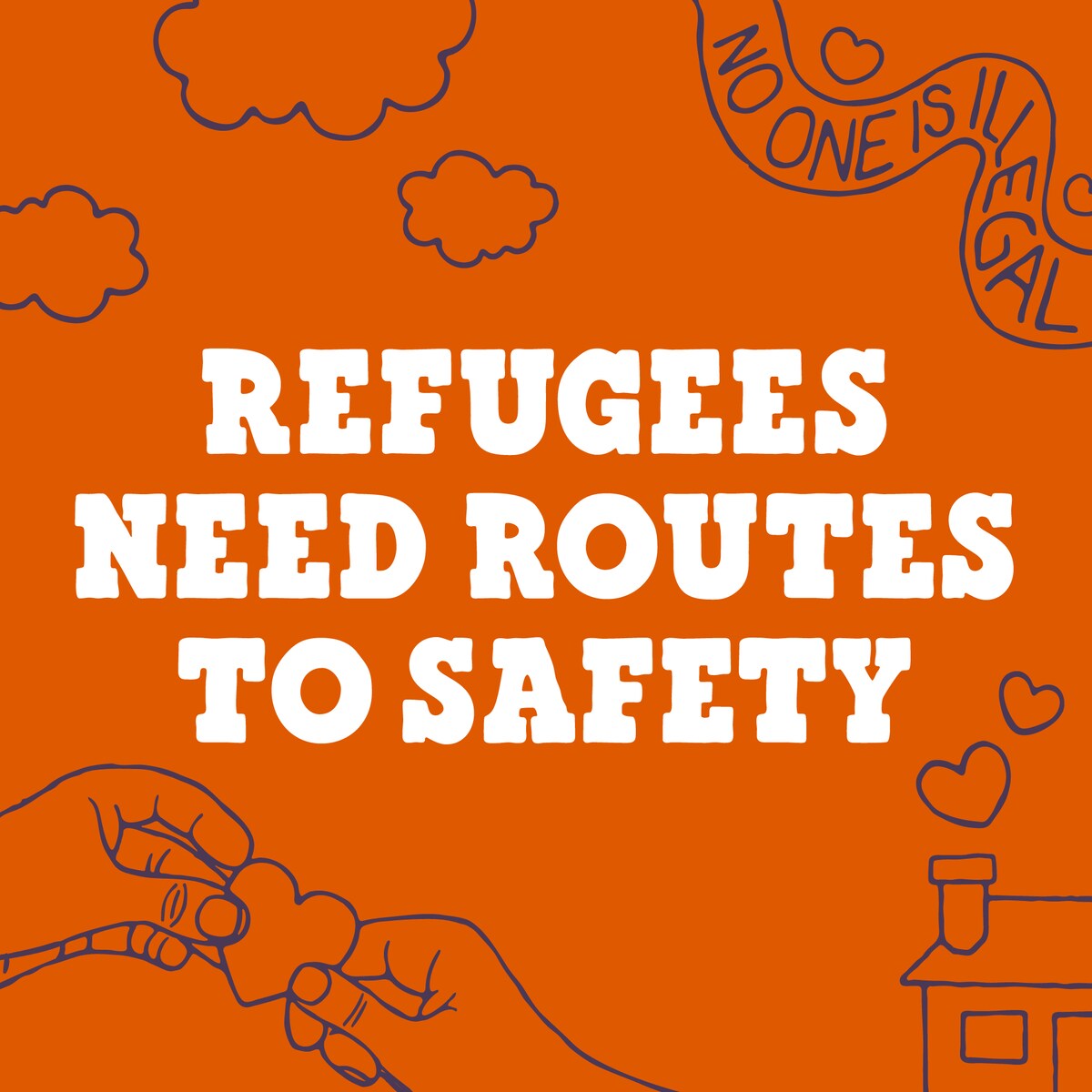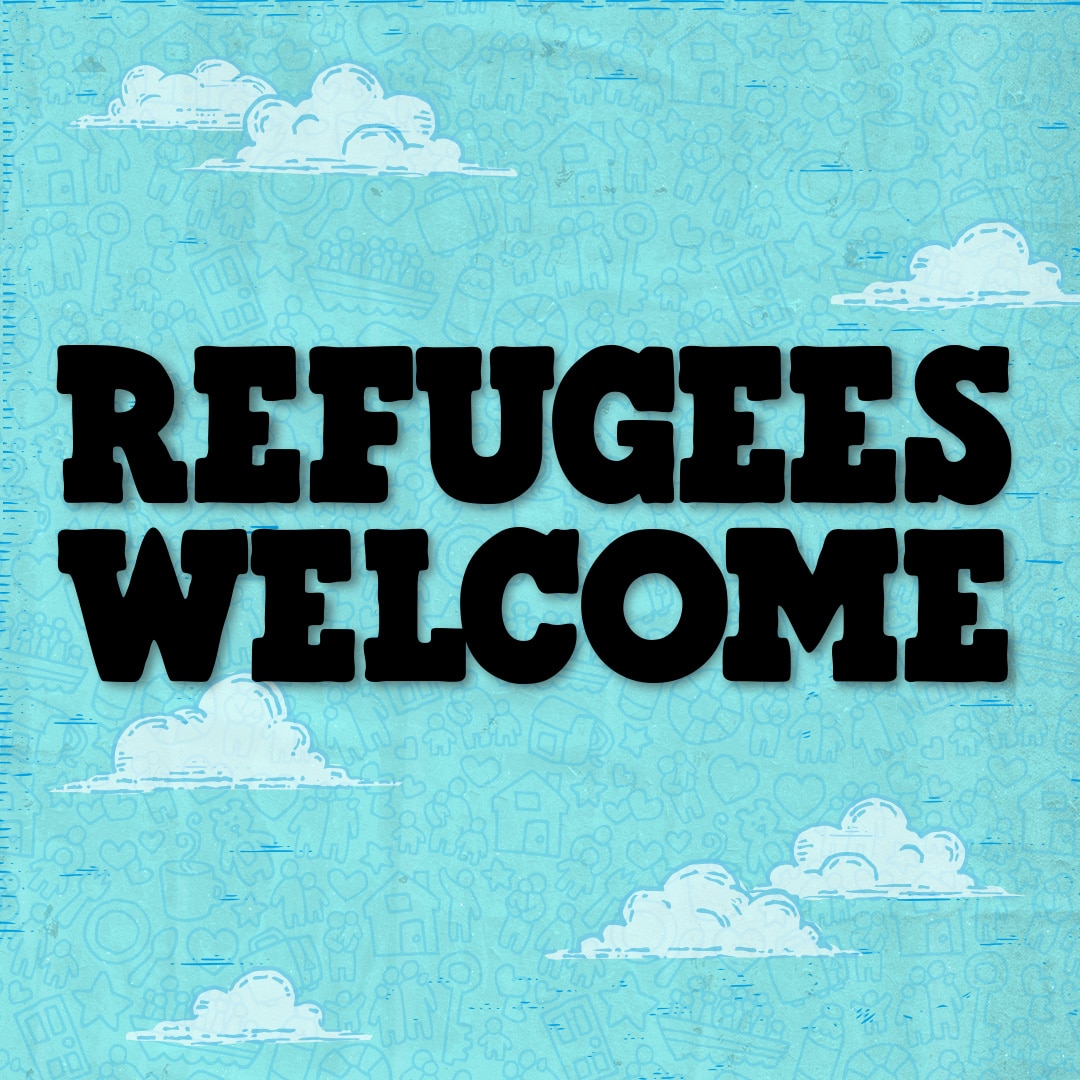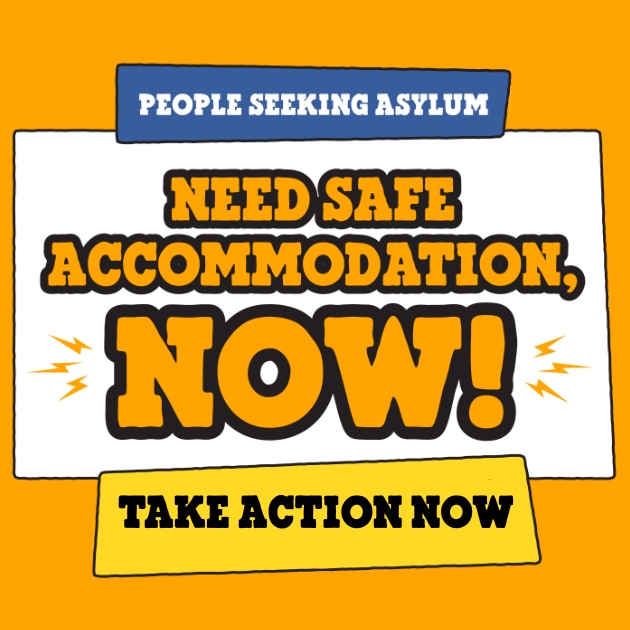
Join us in calling for safe routes for refugees
If enough of us come together we can ensure that people seeking safety are treated with the dignity and compassion which all people deserve.
Join us and our friends at Safe Passage in calling on our new Government to implement safe routes for refugees, by adding your name below.
So why are we asking you to take action today? Because, wherever we come from, we all have a right to feel safe.
Yet sadly, for some people, home is no longer safe. This might be due to war or natural disasters, like for people from Ukraine or Syria. Some people seek safety in other countries because their lives are endangered in their home country due to their political beliefs, religion, or sexual orientation.
Of all refugees globally, only a tiny percentage seek refuge in the UK. Those that do seek safety here, might choose to do so because they already have family here, or because they speak the language – our colonial history is one of the reasons that English is spoken in many countries. To be honest, people have always moved, it’s part of our history. And for refugees who have already gone through so much, retaining some agency about where they rebuild their lives is essential.
Despite this, of the small number of refugees who do seek safety in the UK, many don’t set out with plans to come here. People often talk about ‘safe countries,’ but safety is a feeling and can be different for different people in different places. It can come from being close to family members for example. Safety is emotional and physical. Often people feel unsafe in countries that we might consider to be safe for example. If you've been regularly attacked and had your belongings repeatedly destroyed by authorities in France, then you don’t feel safe and so keep searching for safety elsewhere.
How we treat refugees is about who we are.
We know that most of the British public want to support refugees who need our help. Studies show that 80% of the UK public believe there should be a fair asylum system for people seeking safety and that 50% of the UK public support the creation of visas allowing asylum seekers to travel safely to the UK. Yet it is almost impossible for anyone fleeing persecution to reach the UK safely, meaning people are left with no other option but to risk their lives crossing borders in extremely dangerous conditions.
The Government have abandoned plans to send asylum seekers to Rwanda and have announced their plans to reduce the backlog of asylum applications that haven’t been processed yet. But our concern for their reluctance to announce safe routes into the UK is growing. This lack of safe routes pushes people into making dangerous journeys – just last year 29,347 people crossing the English Channel in small boats - making people vulnerable to exploitation at the hands of traffickers, and far too frequently leading to tragic and preventable deaths. In the past 9 months, 42 people have died trying to cross the Channel. Despite these consequences, politicians are not taking a stance on this issue and are allowing the media to continuously vilify some of the most vulnerable people in the world – refugees.
But it doesn’t have to be this way. We can create an asylum system which treats people seeking safety with dignity and respect. A system which reflects that as compassionate people, we want to welcome and support people who need our help, and which upholds the refugee convention and our international obligations. A system which includes multiple safe routes for people seeking safety to travel to the UK and fairly have their claim heard.
We must show the new Government that we will not let them get away with this.
Upholding the right to claim asylum
Even if there was an abundance of safe routes available, there will always be some people who need to travel to find safety any way they can, and it is vital that they should have their asylum claim heard fairly without penalization or punishment for the method of travel they needed to take. Article 31 of the 1951 UN Refugee Convention was written to explicitly acknowledge the fact that many refugees will need to arrive by irregular routes, and this must be upheld.
People who are granted refugee status having applied for asylum in the UK should be offered the same welcome, safety and support to rebuild their lives, as people arriving through other routes like resettlement schemes.
Safe routes forrefugees and people seeking asylum
The response to the war in Ukraine demonstrated that when there is political will, we can implement safe routes for people seeking safety. But we need schemes which are accessible to people of all nationalities, not just open to a few select few.
So, what would a safe, accessible, effective system look like? Whilst we may not have all the answers, here are some of the changes we believe we need to start with, informed by experts including people with lived experience of seeking safety and the immigration system, and NGO’s:
Travel documents for people seeking asylum
Creating a new travel document for people seeking safety is a crucial way the Government could immediately reduce the number of people who are pushed into dangerous journeys and put at risk of exploitation by traffickers.
The digital visa system which was swiftly set up to allow safe passage for Ukrainians showed that this is possible, which prevented many people from relying on people smugglers to get them to the UK.
New schemes urgently need to be introduced which allow people to be granted a visa to travel safely to the UK where they can then claim asylum. Governments must work with people with lived experience of seeking safety to develop trusted, accessible, and safe schemes.
Refugee resettlement
Resettled refugees have already been granted refugee status meaning they don’t enter the UK’s asylum system on arrival. Whilst resettlement schemes are important, they must never be seen as a replacement for the right to claim asylum as they are two distinct systems.
However, UK resettlement schemes still need significant work. Because right now, the UK Government has no commitment to the numbers of people who they will resettle each year.
So far this year, 1,100 people were able to reach the UK via a UNHCR resettlement scheme, so alongside other safe routes, we want to see a commitment to resettle at least 20,000 people each year in the UK.
Crucially resettlement schemes need to be accessible to people of all nationalities and commitments to supporting people fleeing urgent crises should be considered in addition to these annual commitments.
Enhanced family reunion and support for unaccompanied children
Families belong together. Yet many refugees have become separated from their family and right now don’t know if they’ll ever see each other again. Understandably, this causes huge emotional distress.
We need a system where people granted refugee status in the UK can unite with family members via a working, timely and simple to navigate process so they can rebuild their lives together.
We can set up a scheme to replace the Dubs Scheme so unaccompanied asylum-seeking children can reunite with family members in the UK.
FAQs
-
There are approximately 448,600 refugees in the UK, which makes up 0.6% percentage of the UK population! At the end of March 2024, 118,329 people were still waiting for a decision for their asylum claim. For context, 210,000 people go to Glastonbury Festival every year.
To help put these numbers into perspective, the UK has issued 262,700 visas to Ukrainians and 113,742 to people from Hong Kong. In comparison, 11,500 people have arrived to the UK under the Afghan Citizens Resettlement Scheme. This complicated and near impossible system for Afghans fleeing persecution, to obtain a safe route to the UK, is an example of why so many are falling victim to people smugglers and risking their lives on boats to reach the UK.
-
A refugee is a person who has been officially recognised as needing to flee their country of origin and is unable or unwilling to return because of a well-founded fear of being persecuted because of their race, religion, nationality, membership of a particular social group or political opinion. A person seeking asylum is somebody who has applied for the same protection but is waiting to hear if their application will be granted in line with the above criteria.
-
Safety is a feeling and can be different for different people in different places. Safety is emotional as well as physical. Often people feel unsafe in countries that we might consider to be safe for most people. If you've been regularly attacked and had your belongings repeatedly destroyed by authorities in France, then you don’t feel safe and so keep searching for safety elsewhere.
It also makes no sense that just because we’re further west of most of Europe that we should shun our international responsibility and insist all refugees stay in the first country that we decide is ‘safe’ for them. Of all refugees globally, only a tiny percentage seek refuge in the UK. Those that do seek safety here, might choose to do so because they already have family here, or because they speak the language – our colonial history is one of the reasons that English is spoken in many countries. For refugees who have already gone through so much, retaining some agency about where they rebuild their lives is important.
-
Of all refugees globally, only a tiny percentage seek refuge in the UK. The UK Government are intentionally vilifying a small minority of people to distract from their own failings. They have manufactured a crisis by allowing a huge backlog of asylum claims to build up and are using dangerous, misleading, and inflammatory language as a campaign tool.
Waiting times for claims to be processed have increased eighteen-fold since 2010 and 68% of people seeking asylum are now waiting more than six months for their claim to be processed which not only has a detrimental impact on people’s health while they are trapped in this limbo but also means the accommodation costs for people seeking asylum have also increased. Whilst waiting for their claims to be processed, people are also banned from working which doesn’t make any sense. The UK Government could lift this ban right now, which would allow people to earn their own money and contribute an estimated £333 million to the UK economy each year.
-
Refugee resettlement is the relocation of refugees from a country where they claimed asylum to another country which has agreed to give them permanent residence. Resettled refugees have been deemed the most vulnerable by the UN. Whilst some resettlement schemes exist in the UK, they are mostly limited to people fleeing specific crisis’s and are severely dysfunctional - for example, the UK’s flagship resettlement scheme for Afghans saw only 4 people resettled from refugee camps in the first 16 months since the fall of Kabul. The UK Refugee Resettlement Scheme (UKRS) doesn’t have any targets or commitments for the number of people to be resettled here each year.
Resettlement schemes are important part of refugee protection systems, but it is vital that they are one of several routes to safety and they should never be used to void the right to asylum.
-
At Ben & Jerry’s, we’ve always stood up for issues that matter to us, led by our guiding principles of fairness and equality. We’ve championed a fair few issues over the years to advance opportunity and justice for marginalised communities all over the globe including; LGBTQ rights, climate justice, and working to protect and advance the rights of people seeking a safe place to call home.


